Fellow NOAA Corps officers,
I would like to take a few minutes of your time this week to continue the thread from last week's Cyberflash and dive a little deeper into the training element of professional development. NOAA Corps Directive (NCD) 04303 states "Professional development is a continuing process and is manifested through various types of training programs, either part-time or full-time". NCD 04303 goes on to convey "Each NOAA Corps officer must assess further needs for training in areas of weakness and then seek to obtain such training so as to remain professionally and competitively strong within his/her officer peer group". NCD 04101 is also enlightening as it references part-time training and continuing education courses and how they both help promote job satisfaction as well as enhance promotion potential.
For the most part, we all know about the training courses required to be in the promotion zone for the ranks of LTJG through LCDR and accomplish them in a timely manner. However, I also see quite a bit of NOAA Corps officer files that have large "gaps", sometimes up to 3 years, where no training has been accomplished. Barriers to ongoing training include time commitments, budget constraints, and management support but these obstacles can be overcome. Training does not only consist of the more formal and expensive week long classes many officers think an Officer Personnel Board (OPB) is looking for; these are certainly beneficial but any type of training that makes us a better officer has value. There are hundreds of classes online that can be accomplished at no-cost and with flexible time obligations. My favorite sites are listed at the bottom of this section and contain no-cost courses in dozens of disciplines critical to NOAA Corps officers.
Every NOAA Corps officer has their own goals to "remain professionally and competitively strong" and each one of us has a different timeline, but I would like to share the way I approach training. My personal goal is to take 3 classes each year which I choose based on two entering arguments. First I try to take 1) a class that addresses a strength of mine, 2) a class that addresses a weakness of mine, and 3) a class that is "out of the box". The second entering argument I try to use in course selection is to take a class that 1) would be useful in my current job, 2) would be useful in a future job, or 3) would be useful to my technical discipline (mariner/aviator). In this way I capitalize on what I am known to be good at, show leadership I am continually striving to improve, and incorporate new ideas/skills into my toolbox.
Finally, don't take training just to "check the box". Take training and then use the knowledge to accomplish objectives in your job. Linking training to work accomplishments (hopefully captured in your OER) is a great way to show an OPB that you are managing your career.

CAPT Devin Brakob, NOAA
Director, Commissioned Personnel Center
| 13 June 2018 | Officer Assignment Board |
| CAPT Amilynn Adams | 01 Jun 2018 |
| CDR Nathan Hancock | 01 Jun 2018 |
| LCDR Lyndsey Davis | 01 Jun 2018 |
| CAPT Robert Kamphaus | 01 AUG 2018 |
| LT Jessica Senzer | 10 AUG 2018 |
| LT Adam Ruckman | 24 AUG 2018 |
| LT Gavin Chensue | 31 AUG 2018 |
| LTJG Kathryn Richwine | 05 SEP 2018 |
| LT Kyle Salling | 07 SEP 2018 |
| LT Daniel Langis | 01 OCT 2018 |
| LCDR David Cowan | 26 OCT 2018 |
| LCDR Brian Prestcott | 01 Nov 2018 |
The American Geophysical Union (AGU) is one of the top premier professional societies where NOAA scientists keep engaged with their peers across all sectors of society, and keep current with nationally and internationally recognized standards for conducting scientific work. AGU mission statement reads: "to promote discovery in Earth and space science for the benefit of humanity". One of AGU's organizers and original members, William Bowie, served as its first President (1919-1922). This led the the creation of AGU's highest honor in 1939, the William Bowie Medal, which is still given annually to one honoree in recognition for outstanding contributions for fundamental geophysics and for unselfish cooperation in research.
For more info, please visit: https://honors.agu.org/medals-awards/william-bowie.
William Bowie (1872-1940) was the U.S. Coast and Geodetic Survey's Chief of the Division of Geodesy from 1909 until 1936. During World War I, he served as a major in the U.S. Army in the Mapping Division. After the war, he became instrumental in adopting the Hayford geoid by the International Union of Geodesy and Geophysics (IUGG). His leadership was critical in leading the U.S. Coast and Geodetic Survey to becoming one of the world's leading geodetic institutions. He also had the honor of being the first American to serve as President of the IUGG from 1933-1936.
For more info, please visit: https://honors.agu.org/william-bowie-1872%E2%80%931940
Congratulations to BOTC 131 and OCS 2-18! The class graduated on Thursday, May 17, after seventeen weeks of rigorous training, preparing them to enter the fleet as Junior Officers.
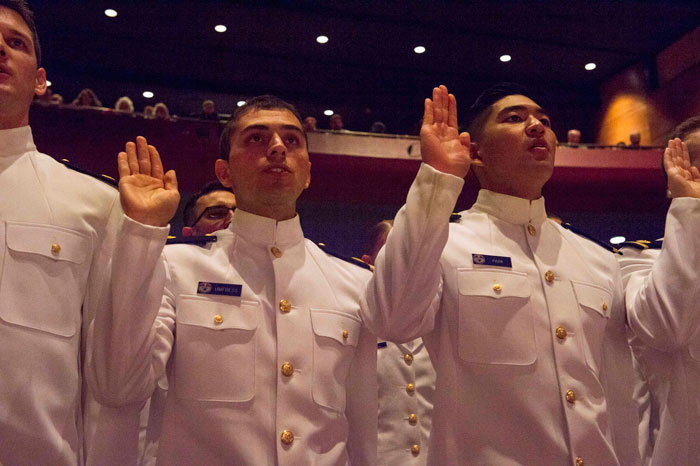
BOTC 131 takes the Oath of Office, administered by RADM Rendon, Superintendent, USCG Academy |
Please help us in recognizing the following award recipients:
Distinguished Honor Graduate: ENS Samuel H. Umfress
Professional Mariner Award: ENS William R. T. Abbott
Academic Award: ENS Nathaniel Y. Park
Health and Physical Readiness Award: ENS Nathaniel Y. Park
Leadership in Writing Award: ENS Samantha L. Flounders
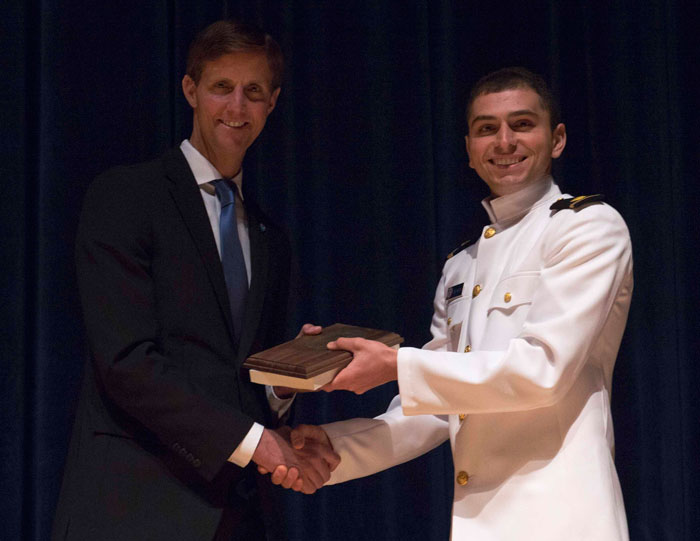
Acting Under Secretary Gallaudet presents ENS Umfress with the Distinguished Honor Graduate award. This award is presented to the NOAA Corps officer candidate who has attained the highest overall average in academics, service aptitude and personal and professional qualities upon graduation. |
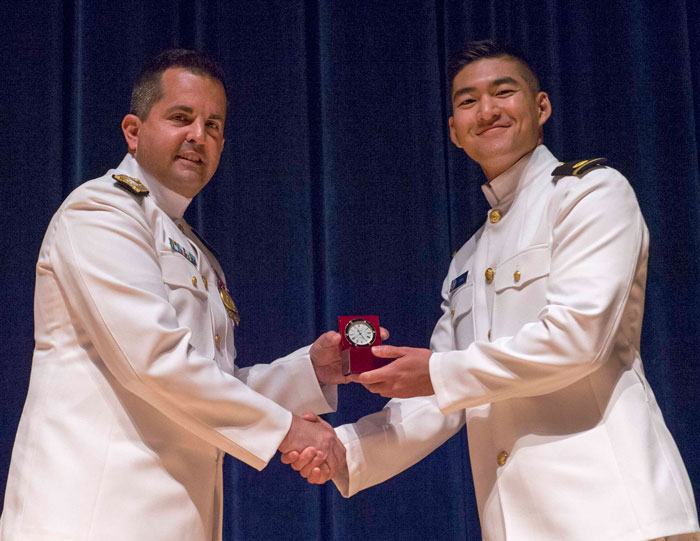
RADM Silah presents the Academic Award to ENS Park. This award is presented to the NOAA Corps officer candidate who has attained the highest academic average during the course of study. |
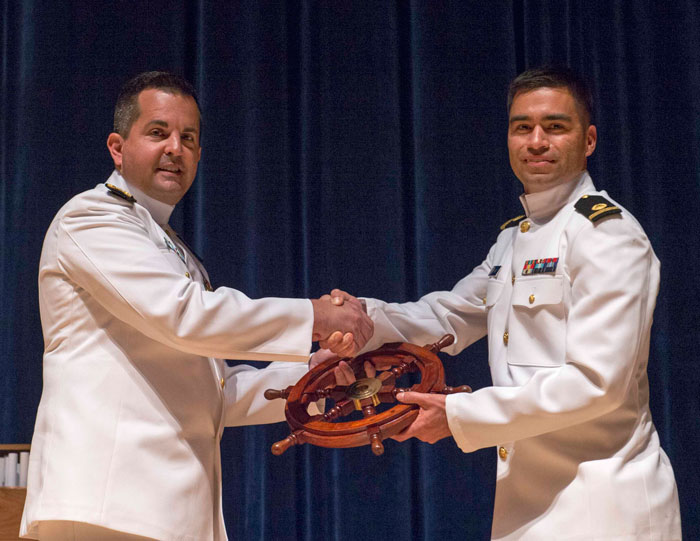
RADM Silah presents ENS Abbott with the Professional Mariner Award. This distinction is awarded to the NOAA Corps officer candidate with the highest academic average in maritime studies who also demonstrated a high level of practical knowledge aboard various underway training platforms. |
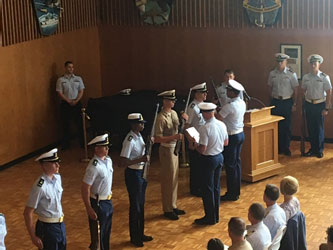
ENS Aldrich proudly represents the NOAA Corps in the final Drill Down Competition alongside his Coast Guard shipmates. |
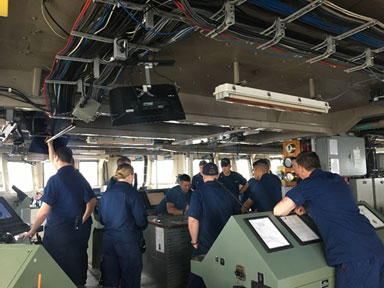
The newly graduated Ensigns of BOTC 131 attend a pre-underway Bridge Resource Management meeting aboard NOAA Ship Henry B. Bigelow prior to their transit out of Newport, RI. |
Bravo Zulu to these individuals for demonstrating excellence throughout BOTC!
The students just returned from their BOTC graduation cruise aboard NOAA Ship Henry B. Bigelow, where they experienced their first underway transit aboard a NOAA ship and had the opportunity to observe navigation through the Cape Cod Canal and Boston Harbor. A special thanks to the wardroom and crew of Bigelow; for giving the students a wonderful introduction to life as a NOAA Corps officer.
The students just wrapped up their Bridge Resource Management training and headed to the fleet on May 31. They are eager to join the ships and put their professional training to use. Congratulations BOTC 131!
When submitting documents via OPF Fix, please remember to select the correct Document Type (system will default to "OPF"). The appropriate Document Type ensures submissions are properly labeled and sent to the correct individuals and folders. This applies to all OPF submissions.
**Note: OERs are not submitted to OPF Fix
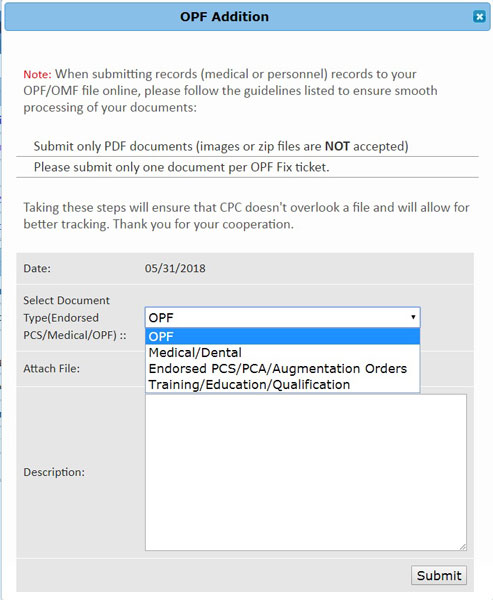
|
Failure to correctly select the appropriate document type will result in your OPF submission being declined. Declined OPF submissions will generate an email notification to the officer with comments on why it was declined. Declined cases will need to be re-submitted by the officer so that the appropriate CPC personnel receive the notification and can take action. All OPF Fix requests must be made by the officer only; CPC cannot accept a request from one officer to add an OPF case for another officer. When Document Type is selected and you are ready to send, click "Submit" one time, otherwise duplicate submissions will result in multiple, redundant open cases.
CPC is looking for a highly motivated officer coming off their second sea tour to become the next NOAA Corps Recruiting Officer. The Recruiting Officer works with the Officer Recruiting Branch Chief to determine annual recruiting event priorities based on statistical information, field recruiter feedback, advance EEO/diversity initiatives, project personnel needs, and research potential new methods of recruitment. The Recruiting Officer is responsible for planning, registering, and scheduling the attendance (by self or other qualified officer) at events determined to be recruiting priorities, tracking the field recruiting budget, and reviewing and approving travel authorizations and vouchers. The officer will develop expertise in public outreach, recruiting, interviewing, budget management, property management, and regulations governing the NOAA Corps appointment process.
The Recruiting Officer must be professional in appearance, actions, and communications. Solid interpersonal skills are imperative for building relationships and interacting with potential applicants. A successful Recruiting Officer usually fleets up to the Chief, Officer Recruiting Branch. If you are interested please contact the current Chief, Officer Recruiting Branch - LT Jared Halonen (jared.r.halonen@noaa.gov) or the Assignment Coordinator for more information.